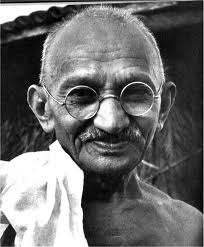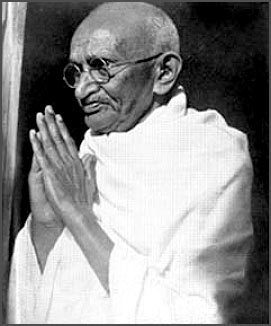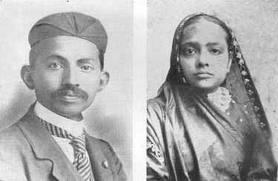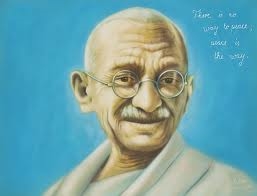 |
| Mohandas Karamchand Gandhi |
A man scampers down a deserted alley in order to escape the angry mob pursing him. As he stops for a breath at a corner, he realizes he’s covered with trash and other waste. Before he is able to cleanse himself from the rubbish, he hears the incoming mob and breaks off in a sprint. Who would have known that this man would become one of the world’s most spiritual and moral heroes: Mahatma Gandhi. Mohandas Karamchand Gandhi was an Indian nationalist leading India’s struggle for independence from Great Britain. As a youngster, Gandhi’s childhood gave little indication to the famous character he would later come to be. Later, on his first job as a young lawyer in British-controlled South Africa he learned firsthand about discrimination against minorities. There, he was kicked out of a first-class passenger seat when a white man entered the train, even though Gandhi had a first-class ticket. After this significant incident, he attempted to bring the grievances of Indians in South Africa to the attention of the British government. After some successes in bringing justice to South-African Indians, he decided to go back to India. Gandhi traveled extensively in India and commenced writing and publishing journals to generate awareness of the unjust British rule in India. He promoted the use of passive resistance, civil disobedience, and boycotts to force the British to relinquish all jurisdictions over India (“Mohandas Gandhi”) and consequently helped India gain independence in a non-violent way during a time in human history where World War II created unspeakable violence. Gandhi’s beliefs not only helped India obtain its liberty, but they also inspired millions of people around the world. One could be inspired by Gandhi’s ability to be “the voice of the common man” and by his determination to win.
 |
| Mahatma Gandhi |
Gandhi’s ability to be “The voice of the common man” proved to the world that he was capable of fighting the British in a non-violent “battle” for freedom and peace. The people of India suffered under British rule and: “Under Gandhi’s guidance, the masses scored impressive victories and his popularity spread. He was able to bridge the gaps between the masses and the educated upper classes, making him one of the most effective leaders” (“Mohandas Gandhi”). Gandhi was named “The voice of the common man” and was not only able to obtain India’s freedom but would also focus on making India a better place to be because he promoted understanding and acceptance of Indians of all backgrounds. This is what made Gandhi such a popular individual, he responded mainly to the people, creating a tight bond between himself and the people of India. He listened to the people of India, and tended to their every request and need. Gandhi helped every man he came upon and these: “Interventions earned Gandhi a considerable reputation, and his rapid ascendancy to the helm of nationalist politics” (“Mohandas Karamchand Gandhi”). Gandhi obtained enough of a reputation that he became a leader in Indian politics. Having power in the political system helped Gandhi focus on promoting the use of passive resistance and civil disobedience instead of violence and war. Gandhi’s ability to be a leader and to help other people in need earned him respect and admiration from the people of India, and later on, people from around the world.
 |
| Gandhi and his wife, Kasturba |
Another reason why Gandhi is so widely revered is the extreme determination he put in his endeavor to free India from the brutal English rule. Gandhi never thought of giving up, in spite of how demanding times where: “Kasturba (Gandhi’s wife) passed away; this was a terrible blow to Gandhi, following closely on the heels of the death of his private secretary of many years” (Vinay). His determination is why Gandhi did not ever give up and did not allow his opponents and personal problems to take him down from his powerful journey to free India. Gandhi himself went through a lot of hardships but he was determined and respected enough to keep it going even when times were tough. Gandhi was sent to jail many times: “Altogether, he spent seven years in prison for political activity. He believed that it is honorable to go to jail for a good cause” (Vinay). Even though Gandhi was jailed for over seven years, he never once thought of giving up in trying to spread his cause and in his attempt to keep India under non-violence. Also, Gandhi used his time in jail to persuade people to be non-violent by fasting in an attempt to quell riots and uprisings, sacrificing his own food in attempt to help others. This shows Gandhi’s determination to win the non-violent “battle” against the British. Gandhi went through a lot of demanding times, but he never thought about giving up his attempt to free India from British rule. Another reason why Gandhi is so widely revered is the extreme determination he put in his endeavor to free India from the brutal English rule. Gandhi never thought of giving up, in spite demanding times where: “Kasturba (Gandhi’s wife) passed away; this was a terrible blow to Gandhi, following closely on the heels of the death of his private secretary of many years” (Vinay). His determination is why Gandhi did not ever give up and did not allow his opponents and personal problems to take him down from his powerful journey to free India. Gandhi himself went through a lot of hardships but he was determined and respected enough to keep it going even when times were tough. Gandhi was sent to jail many times: “Altogether, he spent seven years in prison for political activity. He believed that it is honorable to go to jail for a good cause” (Vinay). Even though Gandhi was jailed for over seven years, he never once thought of giving up in trying to spread his cause and in his attempt to keep India under non-violence. Also, Gandhi used his time in jail to persuade people to be non-violent by fasting in an attempt to quell riots and uprisings, sacrificing his own food in attempt to help others. This shows Gandhi’s determination to win the non-violent “battle” against the British. Gandhi went through a lot of demanding times, but he never thought about giving up his attempt to free India from British rule.
 |
| Mahatma Gandhi Drawing |
As Gandhi once said, “Every worthwhile accomplishment, big or little, has its stages of drudgery and triumph; a beginning, a struggle and a victory.” Through these words of advice, Gandhi tells the world to keep struggling, even if the goal does not seem any closer. Gandhi also said, “Be the change you want to see in the world.” Gandhi tells that if you want the world to change one way, that change has to start with you. Gandhi is an inspiration to a lot of people because he was very determined to do what he did, and because when he wanted to change the world, he started the change with himself. To most people, Mahatma Gandhi will be remembered for being the leader of independence, but I remember him as a motivation, an inspiration, and as a hero.
 |
Lal, Vinay. "Mahatma Gandhi." Manas, n.d. Web. 13 Dec 2010. <http://www.sscnet.ucla.edu/southasia/History/Gandhi/gandhi.html>.
"Mohandas Gandhi." American Decades. Ed. Judith S. Baughman, et al. Detroit: Gale, 1998. Gale Student Resources In Context. Web. 12 Dec. 2010.
"Mohandas Gandhi." U*X*L Biographies. Detroit: U*X*L, 2003. Gale Student Resources In Context. Web. 12 Dec. 2010.
Gandhi, Mahatma. Brainy Quotes. N.p., n.d. Web. 10 Jan 2011. http://www.brainyquotes.com/quotes/author/m/mohandas_gandhi.html.
"Mohandas Karamchand Gandhi." Encyclopedia of World Biography. Detroit: Gale, 1998. Gale Student Resources In Context. Web. 14 Dec. 2010.
Gandhi, Mahatma. Brainy Quotes. N.p., n.d. Web. 10 Jan 2011. http://www.brainyquotes.com/quotes/author/m/mohandas_gandhi.html.
Page created on 1/19/2011 12:00:00 AM
Last edited 9/2/2021 11:20:37 PM
